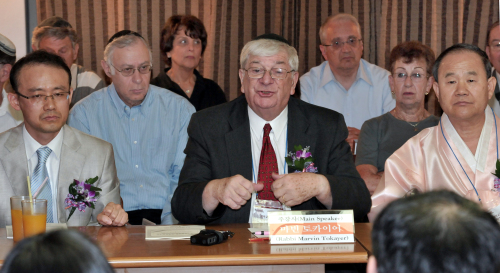To the eyes of an orthodox rabbi who recently revisited Seoul after four decades, the sprawling capital was losing its soul, though it seemed it had undergone an entire rebuilding.
At that time, he had seen few prominent structures other than Bando Hotel near the Seoul City Hall. Now he sees many high-rises but misses traditional values that he says are vanishing.
“Forty years ago, Korea was very poor and just coming out of the war. Then I sensed the wonderful soul in Korean people and they respected their ancient history. Returning now to Korea, yet I worry that as Korea advances with technology and with the computer, Korea is losing its soul,” Marvin Tokayer told The Korea Herald.
“Korea, as a future technology leader, should always look backward to its tradition and ancient history and not abandon its past,” the rabbi said, “Korean culture vanishing along with the technological advancement was one of my concerns.”
At that time, he had seen few prominent structures other than Bando Hotel near the Seoul City Hall. Now he sees many high-rises but misses traditional values that he says are vanishing.
“Forty years ago, Korea was very poor and just coming out of the war. Then I sensed the wonderful soul in Korean people and they respected their ancient history. Returning now to Korea, yet I worry that as Korea advances with technology and with the computer, Korea is losing its soul,” Marvin Tokayer told The Korea Herald.
“Korea, as a future technology leader, should always look backward to its tradition and ancient history and not abandon its past,” the rabbi said, “Korean culture vanishing along with the technological advancement was one of my concerns.”

Tokayer’s first stint in Korea was as a rabbi at an air force base. This past Friday, he returned for a lecture on teachings from the Talmud. In the rabbi’s eyes, it seems like the right time for Koreans to learn the Talmud.
He suggested that Korean parents break from the John Dewey method of teaching and resort to the Talmud’s character building: asking good questions and becoming the best teacher to children at home. The Talmud is a central text in Judaism containing discussions by rabbis about history, ethics and law.
“Teach by asking good questions. When a child comes home from school, a Korean mother would ask, ‘What did you learn today?’ while a Jewish mother will ask ‘What question did you ask today?’”
The rabbi said that the best student is one who asks the best questions in class.
“The Koreans emphasize listening, where a teacher becomes a dictator in class, whilst the Jewish Talmud way of teaching emphasizes asking questions,” he added.
To gain the mentality of asking questions, Tokayer says, students, parents and teachers should practice and adopt what is called the “cooperative learning method.”
“There is a concept of cooperative learning ― in the school when they study Talmud, it is not the teacher who gives the lecture, it is the two or three students studying together, reading it together, questioning each other together, which produces a mentality of asking questions,” he said.
He added that the cooperative learning method could be even more efficient than studying with a teacher.
“Education at home is important, too,” he said. The “Talmud is not a book that you read overnight, it is a lifetime study, and Jews study it for life,” he said.
However, Tokayer pointed out another problem with the Koreans. “Koreans study only when they are in school and they do not study as much when school is over.”
The rabbi emphasized that Korea should move education out of institutions and move it into homes.
“I want to see every parent not only provide toys and money for the family but also play a role as a teacher who studies for himself.”
Fathers should set a good example for children by reading silently beside them, rather than watching TV and leaving the children working alone, he said. “Fathers are the best teachers.”
The rabbi strongly believes that through Talmud study, Jews are able to kill two birds with one stone ― that is to adopt new technology while at the same time preserve ancient traditions in their lives.
“It would be wise for Koreans to learn lessons from the Talmud and as a result be able to blend in new technology and old traditions. If many schools do so here in Korea, they will start to excel,” he said.
According to Tokayer, the Chinese government sent an official to England and Israel to earn a Ph.D. in Jewish studies, come back to China and teach the future professors of Jewish studies from major universities of China.
“The Chinese precedent should be something the Koreans should look carefully upon and learn from.”
“Freud, Marx and Einstein all came from Jewish families. Like the Jews, I want to see Koreans study the Talmud and take up 30 percent of the Nobel Prize,” he said.
By Jurie Hwang (jurie777@heraldcorp.com)


![[Exclusive] Korean military set to ban iPhones over 'security' concerns](http://res.heraldm.com/phpwas/restmb_idxmake.php?idx=644&simg=/content/image/2024/04/23/20240423050599_0.jpg&u=20240423183955)

![[Graphic News] 77% of young Koreans still financially dependent](http://res.heraldm.com/phpwas/restmb_idxmake.php?idx=644&simg=/content/image/2024/04/22/20240422050762_0.gif&u=)



![[Pressure points] Leggings in public: Fashion statement or social faux pas?](http://res.heraldm.com/phpwas/restmb_idxmake.php?idx=644&simg=/content/image/2024/04/23/20240423050669_0.jpg&u=)









